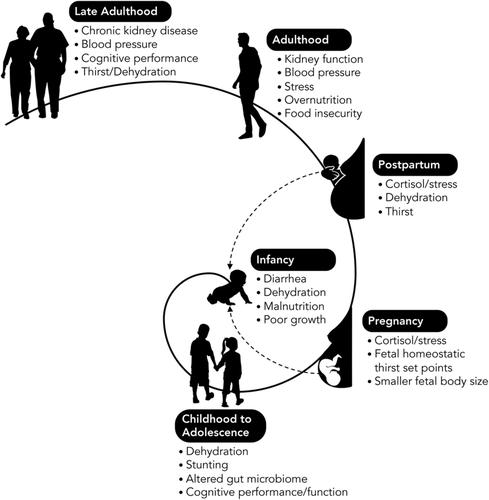当前位置:
X-MOL 学术
›
WIREs Water
›
论文详情
Our official English website, www.x-mol.net, welcomes your
feedback! (Note: you will need to create a separate account there.)
The toll of household water insecurity on health and human biology: Current understandings and future directions
WIREs Water ( IF 6.8 ) Pub Date : 2020-07-16 , DOI: 10.1002/wat2.1468 Asher Y. Rosinger 1, 2, 3 , Sera L. Young 4, 5
WIREs Water ( IF 6.8 ) Pub Date : 2020-07-16 , DOI: 10.1002/wat2.1468 Asher Y. Rosinger 1, 2, 3 , Sera L. Young 4, 5
Affiliation

|
Water is imperative for nutrition and health, economic productivity, and political stability; it also holds cultural and symbolic meanings and functions. Household water insecurity is an emerging construct that captures lived experiences with water access, use, and acceptability. Although the plausibility of household water insecurity to “get under the skin” and shape human biology is high, these relationships have not been systematically investigated. Therefore, in this article, we set out to examine how household water insecurity and allied concepts affect health and human biology throughout the life course. We first lay out the various ways that water insecurity can act as a deleterious exposure, that is, through problematic quality, excess, and shortage. Next, we posit how water insecurity directly shapes human biology, as well as indirectly, via psychosocial stress precipitating cortisol exposure, with potential intergenerational effects. We highlight a range of established and plausible biological consequences using evidence from human and animal model studies. These include diarrheal prevalence, dehydration, stunting, food insecurity, gut microbiome alteration, malnutrition, psychosocial stress, adverse birth outcomes, lower cognitive function and performance, hypertension, and chronic kidney disease. We also discuss the mechanisms by which household water insecurity may shape human biology across the life course; however, these pathways are just beginning to be understood. Longitudinal studies that simultaneously quantify household water insecurity and biological outcomes using comparable metrics in diverse environments and across generations will provide necessary evidence to establish causal relationships. Given the current global water crisis and its potential health consequences, such studies are urgently needed.
中文翻译:

家庭用水不安全对健康和人类生物学造成的损失:当前的认识和未来的方向
水对于营养,健康,经济生产力和政治稳定至关重要。它还具有文化和象征意义和功能。家庭用水不安全性是一种新兴的结构,它可以获取水的获取,使用和可接受性方面的经验。尽管家庭用水不安全状况“深入人心”并影响人类生物学的可能性很高,但尚未对这些关系进行系统的研究。因此,在本文中,我们着手研究家庭用水不安全和相关概念如何在整个生命过程中影响健康和人类生物学。我们首先列出了水不安全状况可能造成有害危害的各种方式,即通过有问题的质量,水量过多和水量短缺。接下来,我们假设水不安全因素如何直接影响人类生物学以及间接影响人类生物学,通过心理社会压力促使皮质醇暴露,并具有潜在的代际效应。我们使用来自人类和动物模型研究的证据,突出了一系列已确立的和合理的生物学后果。这些疾病包括腹泻流行,脱水,发育迟缓,食物不安全,肠道微生物组改变,营养不良,社会心理压力,不良的出生结局,认知功能和表现降低,高血压和慢性肾脏病。我们还讨论了家庭用水不安全状况可能影响整个生命过程中人类生物学的机制。但是,这些途径才刚刚开始被理解。在不同环境和不同世代中使用可比较的指标同时量化家庭用水不安全和生物成果的纵向研究将为建立因果关系提供必要的证据。考虑到当前的全球水危机及其潜在的健康后果,迫切需要进行此类研究。
更新日期:2020-07-16
中文翻译:

家庭用水不安全对健康和人类生物学造成的损失:当前的认识和未来的方向
水对于营养,健康,经济生产力和政治稳定至关重要。它还具有文化和象征意义和功能。家庭用水不安全性是一种新兴的结构,它可以获取水的获取,使用和可接受性方面的经验。尽管家庭用水不安全状况“深入人心”并影响人类生物学的可能性很高,但尚未对这些关系进行系统的研究。因此,在本文中,我们着手研究家庭用水不安全和相关概念如何在整个生命过程中影响健康和人类生物学。我们首先列出了水不安全状况可能造成有害危害的各种方式,即通过有问题的质量,水量过多和水量短缺。接下来,我们假设水不安全因素如何直接影响人类生物学以及间接影响人类生物学,通过心理社会压力促使皮质醇暴露,并具有潜在的代际效应。我们使用来自人类和动物模型研究的证据,突出了一系列已确立的和合理的生物学后果。这些疾病包括腹泻流行,脱水,发育迟缓,食物不安全,肠道微生物组改变,营养不良,社会心理压力,不良的出生结局,认知功能和表现降低,高血压和慢性肾脏病。我们还讨论了家庭用水不安全状况可能影响整个生命过程中人类生物学的机制。但是,这些途径才刚刚开始被理解。在不同环境和不同世代中使用可比较的指标同时量化家庭用水不安全和生物成果的纵向研究将为建立因果关系提供必要的证据。考虑到当前的全球水危机及其潜在的健康后果,迫切需要进行此类研究。











































 京公网安备 11010802027423号
京公网安备 11010802027423号